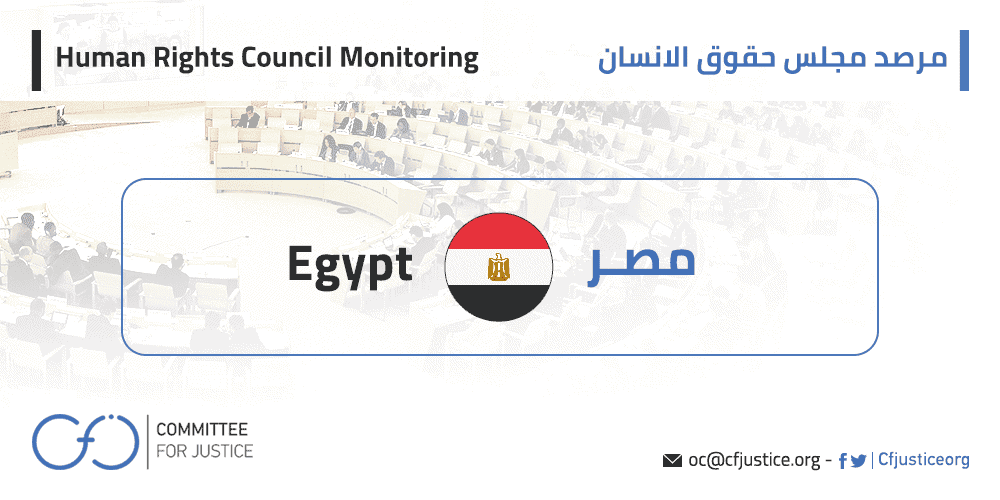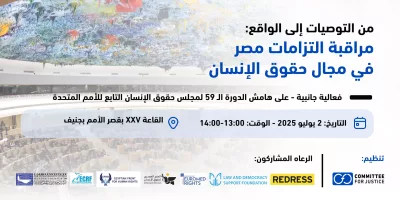News briefing
Edited by: Committee for Justice
Geneva: February 16, 2021
UN experts confirmed that the serious human rights violations that women detained in Al-Qanater Prison in Egypt are subjected to, and their deplorable detention conditions, could amount to torture and cruel, inhuman and degrading treatment.
A degrading transfer method and the ‘New Arrivals’ ward:
In their memo sent to the Egyptian authorities on December 18, 2020, the experts mentioned some of the violations that female detainees are subjected to, including gender-based violence and inhumane and degrading treatment, from the moment the detainees are transferred to the prison. Women detainees are transferred to the prison in the back of a truck without window nor light or ventilation, while sitting on a floor covered in urine and rotten food. Upon their arrival at the detention center, the detainees are transferred to the New Arrivals ward (al-Irad), which is a small room with 9 beds without ventilation, where they are held for eleven days before being distributed to cells and prison wards. The detainees cannot receive visits, exercise or even take a shower or brush their hair.
Lack of separation and body-search:
The experts pointed out in their memo that the Egyptian Prison Regulations Law of 1956 stipulated that detainees must be separated according to several criteria, such as the type of crime, the length of the sentence, the criminal risk, and the age of the detainee. However, in 2014, the Ministry of Interior issued Decree No. 3320/2014, in which it indicated that the classification of prisoners must take into account the capacity of the prison, and based on this decree, and because of the overcrowding, the separation of detainees is not done on the basis of the type of crime. Consequently, female prisoners held on politically motivated charges are often placed in the same cells as female prisoners convicted of common criminal offenses, which increases the risk of abuse of the former by the latter.
Detainees in Al-Qanater are also regularly subjected to a naked body search, “personal-search”, where they are forced to stand naked in front of each other, and some of them have gone through vaginal searches.
A former prisoner recounted that the warden picked up a plastic bag from the floor and wore it in her hands to inspect her body cavities in a very humiliating manner. It was also reported that one of the detainees filed a complaint after being harassed by two prison guards who are known to have sexually harassed the detainees during the physical search, however the necessary measures were not taken to stop the abuse or hold the perpetrator accountable. The Prison regulations do not prohibit or make any reference to sexual and gender-based violence against inmates and there are no mechanisms for reporting sexual and gender-based violence, denying victims’ access to remedy.
Displacement, stripping and solitary confinement:
The experts stated that the detainees in Al-Qanater, who violate the prison rules, are often subjected to punishment at the hands of the discipline officer in the ward called “Nabatshia “.
The experts noted that there are two types of punishment: the “tashreeda” and the “tagreeda”. Tashreeda consists of taking the detainee out from her ward, after stripping her of all her personal belongings, and placing her in another ward, and tagreeda consists of stripping the detainee of her clothes and personal belongings.
Prolonged solitary confinement is also used as a means of punishment, as the solitary cell is 180 cm long, 160 cm wide, and has no ventilation. Urination is allowed once a day, and a bucket is kept inside the cell for urination at other times. Female detainees in solitary confinement receive only one meal in a day.
Lack of personal hygiene items:
In their memo, the experts also stated that the detainees in Al-Qanater were not provided with sufficient clean water, so they are not able to wash themselves or their clothes, and they are not provided with soap, toilet paper, toothpaste, and other personal hygiene materials.
Experts added that, in addition to all of this, Al-Qanater Prison is extremely overcrowded, and a bed is not provided for every detainee, and sometimes two women share the same bed, which is only 80 cm wide, and that in the New Arrivals ward there are only 9 beds, and there are from 30 to 90 inmates.
Experts said that this overcrowding forced most of the inmates to sleep on the floors and inside the bathrooms, and the beds are only available for those who can pay. In wards 1 and 2, at least 560 female detainees share 120 beds only, which is four times its capacity. In ward 10, the ward allocated for sick detainees, at least 175 women share 50 beds. Overcrowding has also led to a significant reduction of the visits’ time to 10 minutes only.
Failure to obtain adequate health care:
As for the health services in Al-Qanater prison, the experts mentioned that they are very poor, as there is not a single resident doctor in the prison hospital who specializes in gynecology. Other specialized doctors, such as an ophthalmologist, dentist and dermatologist come once a week. However, no psychiatrists, physiotherapists, neurologists, nor doctors specializing in emergencies are available to inmates.
Pregnant and nursing women detainees:
According to the UN experts’ memo, the ward designated for pregnant and nursing women is the most overcrowded, although its capacity should not exceed 50 detainees, but it often accommodates between 130 and 150 detainees in addition to their children, so most of them are forced to sleep on the floor.
Nursing mothers and pregnant women also receive the same poor quality of food as other detainees, in very low quantities, and unclean water, which may affect mothers’ ability to breastfeed their children, and lead to starvation and malnutrition of newborns. It is reported that, due to the inhumane conditions in the mothers and nursing women’s ward, many women detainees decide to leave their children behind with the authorities or secondary caregivers.
The experts expressed serious concerns about the lack of gender-specific measures that meet the needs of women detainees, the denial of access to facilities and materials to meet women’s personal hygiene needs, including good quality sanitary pads provided free of charge, and the failure to meet basic standards in terms of food and accommodation, as outlined in the United Nations Standard Minimum Rules for the Treatment of Prisoners (the Nelson Mandela Rules), and the Rules for the Treatment of Women Prisoners and Non-custodial Measures for Women Offenders (the Bangkok Rules). The failure to implement them may amount to discrimination against women, and thus fall within the scope of the Convention on the Elimination of All Forms of Discrimination against Women (CEDAW).
The experts also expressed particular concern about the lack of redress and accountability mechanisms for victims of sexual violence, as well as the lack of specific health services and psychological support, and the high number of pregnant and nursing women detainees and their conditions of detention, emphasizing the need to prefer non-custodial measures when judging pregnant or breastfeeding women where possible and appropriate
UN demands from the Egyptian authorities:
At the conclusion of their memorandum, the experts called on the Egyptian authorities to determine the measures that they have adopted or plan to adopt to ensure that the presented accommodation meets all requirements regarding safe drinking water and clean water for washing, minimum floor space, lighting, heating, ventilation and beds.
They have also urged Egypt to clarify the human rights-compliant alternatives to detention, particularly for pregnant women, and whether they are being regularly employed, and provide details about efforts to address allegations of inadequate access to health care, including reproductive health services and information, by women held in detention facilities, and measures to mitigate the risk of exposure to infection and the necessity of adequate mental health care.
The experts also called on Egypt to clarify any measures being taken to address sexual harassment and gender-based violence in prison, the accountability mechanisms available to female detainees who wish to file a complaint and obtain redress, as well as determine any measures taken to investigate allegations of torture and other cruel, inhuman or degrading treatment or punishment, the prosecution of those responsible, and justice and rehabilitation for the victims.






